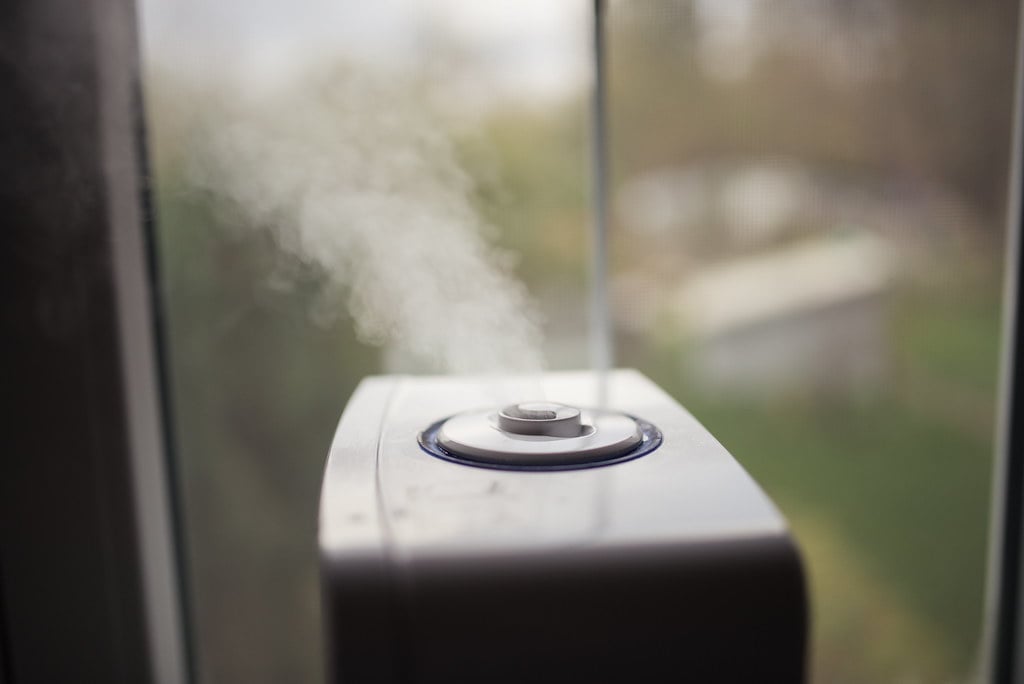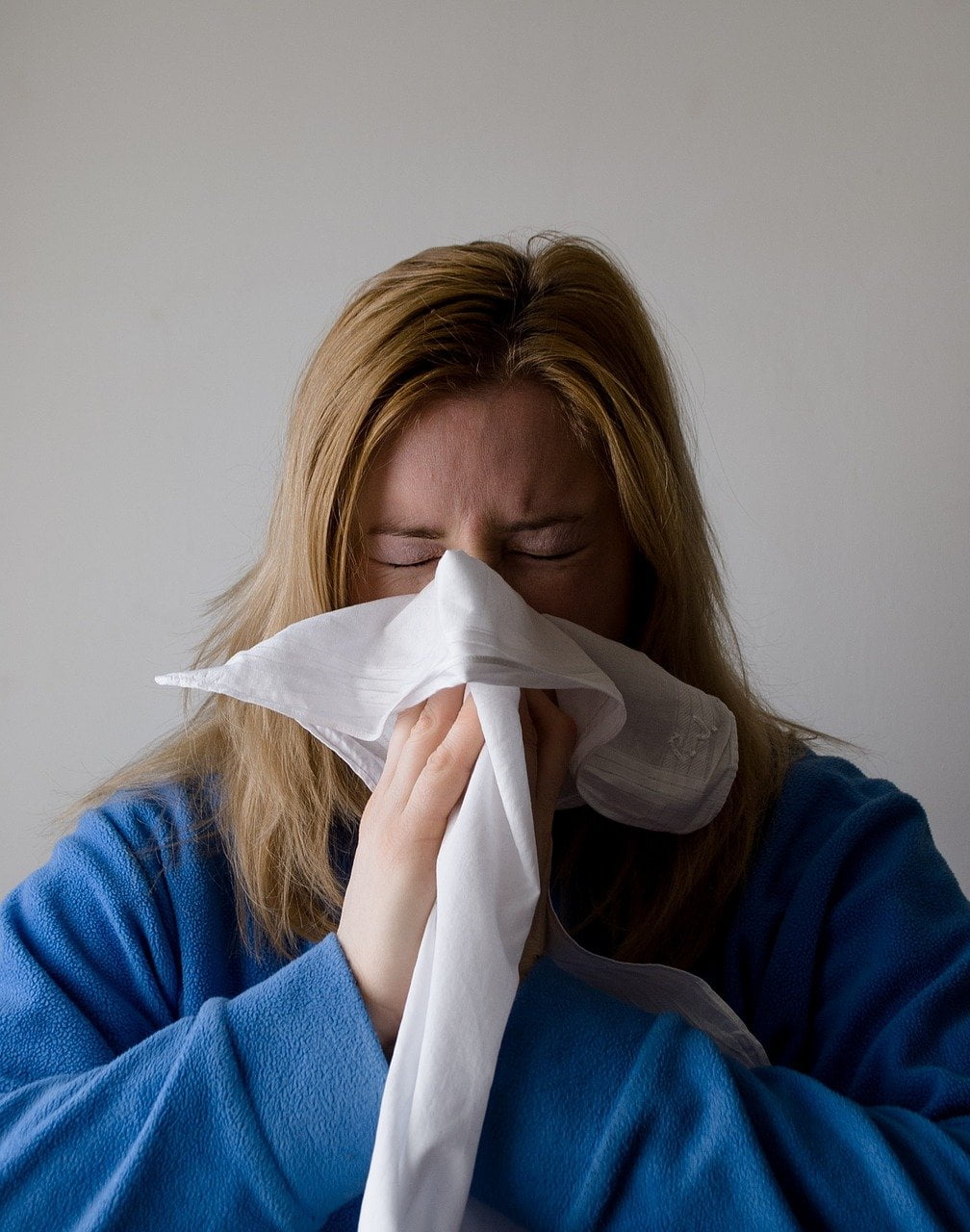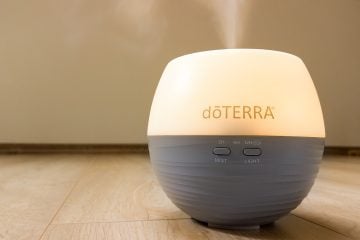Take a deep dive into whether or not humidifiers help with allergies, what type of allergies you may be suffering from, and the benefits of using a humidifier in your home so you can explore what solution is best for you.
Does A Humidifier Help With Allergies?
Humidifiers’ purpose is simple: increase the level of humidity in the air, whether that’s throughout your entire house or in a specific room. The machines are able to do this by releasing water vapor and/or steam into the air. Depending on your situation and needs, humidifying your air could be beneficial to you or cause more problems with your allergies than you had before.
First, let’s discuss the various types of allergies and the symptoms that can come along with them.

Food Allergies
Food allergies and intolerances are extremely common for people to experience. There are also various types of food groups that can cause people to have reactions and/or irritations when they eat these particular foods. Some of those food groups include:
Dairy (Milk specifically)
People often confuse a milk allergy with lactose intolerance. The easiest way to identify which one you are experiencing is to evaluate your symptoms. If you’re lactose intolerant, you’ll most likely have bad stomach pain, diarrhea, and gas, but if you have a milk allergy, your body may respond more aggressively to protect against what it thinks to be a toxic invader. Milk allergies cause vomiting, diarrhea, and a multitude of wheezing problems. If you are experiencing the milk allergen symptoms listed above, avoid these dairy products:
- Sour cream
- Yogurt
- Cheese
- Ice Cream
- Butter
- Pudding
- Custard
Shellfish
Managing your seafood allergy doesn’t have to be difficult. Be aware that avoiding these foods may be in your best interest if you have a seafood allergy: fish sauce or oils, any artificial fish, fish eggs (caviar), and anything that may contain anchovies. There are simple tips you can follow to help you avoid contact with seafood as well. These best practices include avoiding seafood restaurants, discussing precautionary measures with your doctor, and thoroughly reading every food label before purchasing.
Nut Allergies
Nut allergies are one of the most common food allergies. Though they can be hard to avoid, it is imperative to stay away from all peanuts, tree nuts, and foods that contain nuts. The level of reactions can vary, but some of the most common symptoms include tightening of the throat, vomiting, stomach pain, and skin rash.
Some tree nuts to look out for include:
- Cashews
- Macadamia nuts
- Almonds
- Hazelnuts
- Pecans
- Walnuts
- Pistachios
- Chestnuts
Some foods to look out for that contain nuts:
- Cereal
- Granola
- Energy Bars
- Baked Goods
- Chocolate candy
- Trail Mix
- Veggie Burgers
- Condiments/Sauces
- Honey
- Salad/Salad Dressing

Other very common food allergies include protein (such as whey and casein), eggs, fish, sulfite, wheat, and soy.
Respiratory Allergies
Respiratory allergies can include environmental and seasonal allergies, both of which are common in children and adults. These include reactions to pollen, dust, mold, pets, or conditions during the fall, winter, summer, and spring months.
Seasonal allergies are caused by various outdoor conditions and change throughout the warm and cold seasons. Hay fever commonly gives people trouble in the spring and summer because that’s when plants begin to release pollen in the air. Pollen, trees, grass, and weeds are all major triggers for seasonal allergy symptoms such as watery eyes, coughing, sneezing, runny nose, and more.
Fall allergy triggers are a bit different from spring and summer. Things such as dust mites, mold, and ragweed are the most influential factors to people who suffer from fall allergies. Winter triggers are also very similar because that’s when people spend the most time inside of their homes.
Aside from the common food and respiratory allergies, there are various skin, medicinal, and eye allergies people experience as well. However, let’s jump into how and why humidifiers are able to help with allergy troubles throughout the year.

Allergies: Final Thoughts
It’s extremely important to understand the type of allergies you have and the symptoms you experience because those directly correlate with the type of humidifier that is best suited for you. Once you have that figured out, your next steps should include understanding the different kinds of humidifiers on the market and which one you should try out for your home.
Humidifiers: Do they increase or decrease allergy symptoms?
It’s important to note whether or not you experience allergic rhinitis symptoms or are triggered by other household allergens such as dust mites and mold.
If you commonly notice nasal congestion, inflammation, and irritation, then you need to find remedies to reduce that inflammation so your nose is able to release those allergens from your nasal cavity. Once those are blown out, you’ll immediately notice an improvement in your allergy symptoms, and one way you’re able to help relieve these symptoms is through a humidifier. Humidifiers are able to increase the level of humidity in your house, bedroom, living space, or anywhere necessary so you’re able to experience lessened allergy symptoms.
However, your humidity levels can also cause a reverse effect if your body negatively reacts to mold and dust mites. These two triggers are able to thrive in high humidity environments, so it’s actually better to have your air at a lower humidity level.
This is why it’s crucial to understand your allergies, how you react to them, and what level of humidity helps reduce them best. Finding that perfect medium between dry and damp air is your ticket to easier breathing! Now, let’s take a look at the different kinds of humidifier models so you can decide which one is the best humidifier for you.
Types of Humidifiers
There are many types of humidifiers on the market to choose from, including cool mist, warm mist, steam vapor, air washer, evaporative, and ultrasonic humidifiers, so let’s take a look at what each one is able to accomplish.
Cool Mist Humidifiers
Cool mist humidifiers are typically better for people in warmer climates or going through the spring and summer seasons because it emits cool vapors that moisturize the air. Cool mist is also known to help people experiencing a cold. The vapors help reduce coughs and congestion.
These humidifiers are known to be slightly noisier than other humidifiers but remain easy to clean and low maintenance. Research has gone back and forth, however, cool mist humidifiers tend to be better for children, pets, and larger spaces.

Warm Mist Humidifiers
A warm mist humidifier has similar benefits to the cool mist humidifiers but is actually said to be a bit quieter. The warm mist can be helpful in the chilling months of winter and is still great for adding moisture to dry indoor air. Experiencing a cold or flu when the weather gets colder is extremely common, so setting up a warm humidifier in your home during that time is a great idea. They’re known for helping with a stuffy nose because the warm mist is able to help break down mucus in the nose and throat, making it easier to cough up and get out of your system.
Steam Vapor Humidifiers
A steam vapor humidifier is quite different from a cool-mist humidifier because of how the water is handled and released. Steam vaporizers heat the water, similar to boiling a pot of water, to create a gas (the steam is cooled before being released into the air). When the water is being heated, harmful bacterias, mold, and algae are destroyed and minimize the number of irritants floating around your home that you are breathing in.
Air Washer Humidifiers
An air washer humidifier is great because it has dual purposes. Air washer purifiers act as both a humidifier and an air purifier, where moisture is still getting added to the air, but allergens are still getting removed. This helps prevent multiple allergy symptoms you may experience throughout the year.
Evaporative Humidifiers
Evaporative humidifiers act just like all the other humidifiers by increasing your home’s humidity and reducing air impurities such as dust and pollen. What sets this humidifier apart is how the water is released into the air. Instead, the device evaporates the water inside of itself by using a fan to increase evaporation speed and then sends water vapor into the air to help with its moisture.
Ultrasonic Humidifiers
Ultrasonic humidifiers are pretty cool because of their use of vibration to help with air moisture. A metal diaphragm vibrates at a fast frequency within the device to create cool or warm mist and then its sound vibrations are able to release moisture into your house’s air. Research varies on this type of humidifier but a general consensus says that these might help allergies and are probably not the best option if that’s the sole reason you need a humidifier implemented in your home.
Final Thoughts
If you’re on the lookout for a humidifier, remember to consider what your needs are and what types of humidifiers help with those needs the most. Many people experience allergies, however, it’s critical for you to understand the types of allergies you have, the seasons or conditions you experience them in, and what remedies can help relieve them the most! Weigh the pros and cons of each humidifier and find the one that suits you the best!
Sources:
https://www.medicinenet.com/how_to_know_lactose_intolerant_or_allergic_to_milk/article.htm
https://www.yalemedicine.org/news/seasonal-allergies
https://www.articleinsider.com/humidifier
https://www.medicalnewstoday.com/articles/327156#what-is-the-difference




